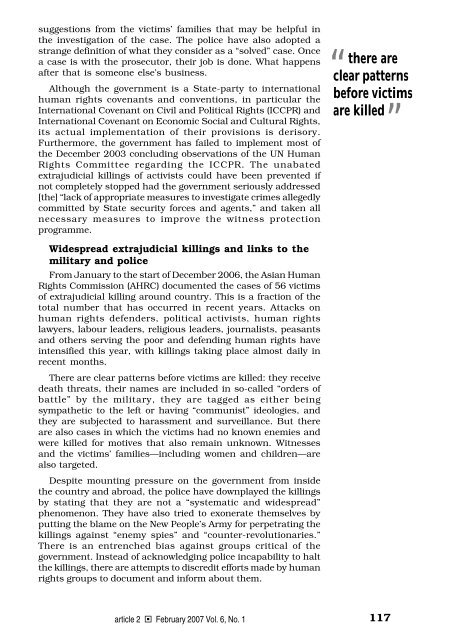of the Philippines the criminal justice system is - Article 2
of the Philippines the criminal justice system is - Article 2
of the Philippines the criminal justice system is - Article 2
You also want an ePaper? Increase the reach of your titles
YUMPU automatically turns print PDFs into web optimized ePapers that Google loves.
suggestions from <strong>the</strong> victims’ families that may be helpful in<br />
<strong>the</strong> investigation <strong>of</strong> <strong>the</strong> case. The police have also adopted a<br />
strange definition <strong>of</strong> what <strong>the</strong>y consider as a “solved” case. Once<br />
a case <strong>is</strong> with <strong>the</strong> prosecutor, <strong>the</strong>ir job <strong>is</strong> done. What happens<br />
after that <strong>is</strong> someone else’s business.<br />
Although <strong>the</strong> government <strong>is</strong> a State-party to international<br />
human rights covenants and conventions, in particular <strong>the</strong><br />
International Covenant on Civil and Political Rights (ICCPR) and<br />
International Covenant on Economic Social and Cultural Rights,<br />
its actual implementation <strong>of</strong> <strong>the</strong>ir prov<strong>is</strong>ions <strong>is</strong> der<strong>is</strong>ory.<br />
Fur<strong>the</strong>rmore, <strong>the</strong> government has failed to implement most <strong>of</strong><br />
<strong>the</strong> December 2003 concluding observations <strong>of</strong> <strong>the</strong> UN Human<br />
Rights Committee regarding <strong>the</strong> ICCPR. The unabated<br />
extrajudicial killings <strong>of</strong> activ<strong>is</strong>ts could have been prevented if<br />
not completely stopped had <strong>the</strong> government seriously addressed<br />
[<strong>the</strong>] “lack <strong>of</strong> appropriate measures to investigate crimes allegedly<br />
committed by State security forces and agents,” and taken all<br />
necessary measures to improve <strong>the</strong> witness protection<br />
programme.<br />
<strong>the</strong>re are<br />
clear patterns<br />
before victims<br />
are killed<br />
“<br />
”<br />
Widespread extrajudicial killings and links to <strong>the</strong><br />
military and police<br />
From January to <strong>the</strong> start <strong>of</strong> December 2006, <strong>the</strong> Asian Human<br />
Rights Comm<strong>is</strong>sion (AHRC) documented <strong>the</strong> cases <strong>of</strong> 56 victims<br />
<strong>of</strong> extrajudicial killing around country. Th<strong>is</strong> <strong>is</strong> a fraction <strong>of</strong> <strong>the</strong><br />
total number that has occurred in recent years. Attacks on<br />
human rights defenders, political activ<strong>is</strong>ts, human rights<br />
lawyers, labour leaders, religious leaders, journal<strong>is</strong>ts, peasants<br />
and o<strong>the</strong>rs serving <strong>the</strong> poor and defending human rights have<br />
intensified th<strong>is</strong> year, with killings taking place almost daily in<br />
recent months.<br />
There are clear patterns before victims are killed: <strong>the</strong>y receive<br />
death threats, <strong>the</strong>ir names are included in so-called “orders <strong>of</strong><br />
battle” by <strong>the</strong> military, <strong>the</strong>y are tagged as ei<strong>the</strong>r being<br />
sympa<strong>the</strong>tic to <strong>the</strong> left or having “commun<strong>is</strong>t” ideologies, and<br />
<strong>the</strong>y are subjected to harassment and surveillance. But <strong>the</strong>re<br />
are also cases in which <strong>the</strong> victims had no known enemies and<br />
were killed for motives that also remain unknown. Witnesses<br />
and <strong>the</strong> victims’ families—including women and children—are<br />
also targeted.<br />
Despite mounting pressure on <strong>the</strong> government from inside<br />
<strong>the</strong> country and abroad, <strong>the</strong> police have downplayed <strong>the</strong> killings<br />
by stating that <strong>the</strong>y are not a “<strong>system</strong>atic and widespread”<br />
phenomenon. They have also tried to exonerate <strong>the</strong>mselves by<br />
putting <strong>the</strong> blame on <strong>the</strong> New People’s Army for perpetrating <strong>the</strong><br />
killings against “enemy spies” and “counter-revolutionaries.”<br />
There <strong>is</strong> an entrenched bias against groups critical <strong>of</strong> <strong>the</strong><br />
government. Instead <strong>of</strong> acknowledging police incapability to halt<br />
<strong>the</strong> killings, <strong>the</strong>re are attempts to d<strong>is</strong>credit efforts made by human<br />
rights groups to document and inform about <strong>the</strong>m.<br />
article 2 • February 2007 Vol. 6, No. 1 117

















